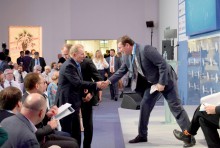Having relocated from Crimea to Kyiv, the Yalta European Strategy (YES) attracted many visitors this year, both Ukrainian and foreign. It seems that Viktor Pinchuk’s “compromises” have already been forgotten, and starting with the first person of the state and ending with ordinary experts and journalists, everyone decided to make an appearance at the YES. The benefits of this event for our country are of dubious nature (the strategy was so “good” that the forum became homeless, not to mention the current realities in Ukraine), but as for the task of whitewashing the image of the Kuchma family, the event seems to work much better. In general, this forum has long been a test for our so-called political elite. An overwhelming majority of them have been failing it.
Current Prosecutor General Yurii Lutsenko did not overlook the YES either. Former active fighter against the Kuchma regime, he spoke on the rule of law on the 17th anniversary of the kidnapping and murder of journalist Georgy Gongadze. In fact, were one to briefly characterize this whole situation, it was a clear case of supreme cynicism.
“All those people who want to show that we know about the crimes of the regime have come to Khreshchatyk, and we will not endure the criminals at the helm of the government. We will continue to push for our demands to be met, in particular, our first goal which is the dismissal of the criminal Minister of Internal Affairs Yurii Kravchenko. And only then can we start talking with the present regime. Of course, the talks themselves should be limited to the conditions and time of Kuchma’s departure to take some long-awaited (by us) rest” – Lutsenko made this statement during the “Ukraine without Kuchma” protests in the winter of 2001.
Viktor SHYSHKIN, legal representative of Oleksii Podolsky, the first Prosecutor General of Ukraine (1991-93), Judge of the Constitutional Court of Ukraine (2006-15):
“The decision of the Constitutional Court is ambiguous. In one place, they write that any recording should be authorized by a court, but elsewhere they write that an accidental recording (for example, one made by a video recorder in a car) can be admitted as evidence. No one receives authorization to record a road accident on the video recorder, after all. I wrote a separate opinion, and then gave some clarifications on the case of Gongadze-Podolsky to the Court of Appeal on how to correctly understand these provisions governing the use of the technical means of surveillance. The question is who needs authorization for making recordings. Does it apply to everyone or only to those officials whose powers include the use of such means? At the beginning of the 1990s, this provision existed to combat wiretapping abuses of the former KGB and the Ministry of Internal Affairs. But, I repeat, this does not apply to accidents. The case of Mykola Melnychenko’s tapes was accidental, because his powers did not include investigations which have to do with the use of special technical means. There are some fine points of law at play here, and, indeed, the decision of the Constitutional Court can be a certain obstacle. But only the court hearing the case can rule on admissibility of any materials that can be used as evidence. Therefore, Lutsenko is partially right. His words are partly reasonable, but he may not use the Constitutional Court’s ruling to cover his inaction.
“Let us explore the following line of thought. Melnychenko provides his tapes and they are deemed to be inadmissible according to, I emphasize, a single provision of the Constitutional Court’s ruling. Citing the tapes, Melnychenko speaks as a witness. His testimony is put into writing and signed by him. This is evidence. Then why is the tape itself not evidence, and the words of Melnychenko are? After all, they cannot refute the explanations of a witness which they offered to the investigation and are ready to repeat in court as well. They will say the same things which are recorded on the tapes. So where is the logic in all that? I understand that if there were no testimony of Melnychenko himself available, then it would be possible to argue here about the tapes. No one can refute the fact that the witness testimony is admissible under the Code of Criminal Procedure. Then the tapes cited by Melnychenko are admissible as well. Therefore, Lutsenko’s words largely reflect his attempts to cover his inaction and to clear either Leonid Kuchma or another team with whom he, by the way, shook hands at the YES.”







